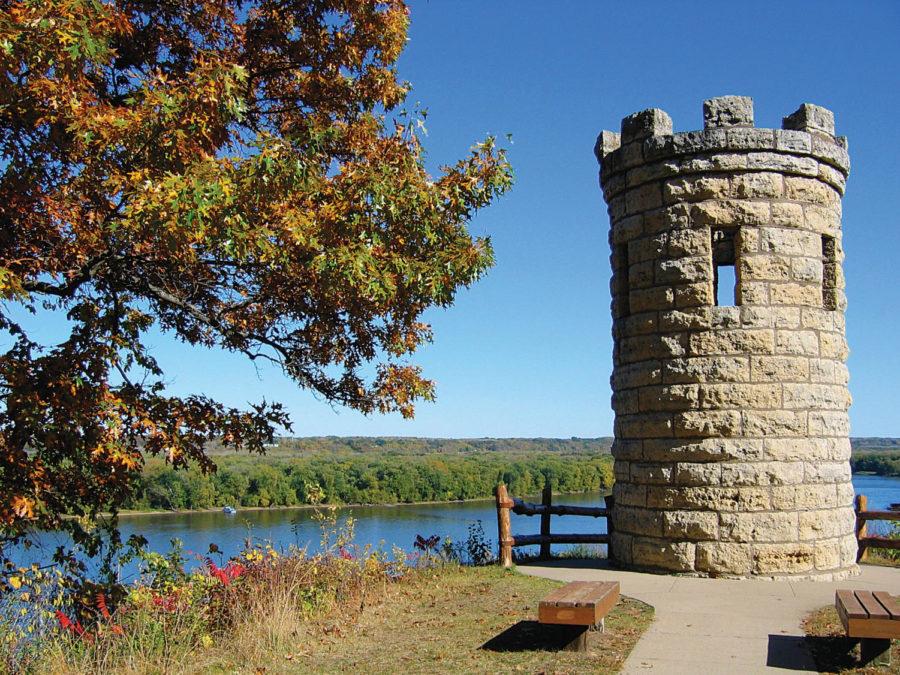Belding: Study abroad deadline looms, but Iowa is full of opportunities too
Justin Phelan / Think stock photo
Julien Dubuque’s grave, located in Dubuque, Iowa, is a beautiful historic monument. Columnist Michael Belding believes there is plenty to explore in the United States, rather than studying abroad in search of adventure.
March 12, 2013
Ranking among the many causes for excitement this week, with Spring Break fast approaching, is the deadline to apply for study abroad programs that will take place in the fall 2013 semester.
Indeed, taking a few months to get away from Iowa State and attend a foreign college is one of the more-touted possibilities for the students here. For example, to potential transfer students the admissions office portrays Iowa State as a hub of possibilities that includes study abroad. Among the “endless” possibilities for composing “the ultimate college adventure” is “Study abroad in Spain.” For potential freshmen, admissions says their adventure could include an experience as an “Intern in Italy.”
Without question, studying abroad opens the eyes of Americans (the most privileged nationality in the history of the world), builds our character as we encounter new cultures and provides us with a background of multiculturalism that we can use to understand cultures different from our own.
I could have studied abroad for my entire undergraduate career. My senior year of high school, I applied to the University of Edinburgh, in Scotland. A few months later, I received a notice that I had been admitted. For a variety of reasons, first and foremost that of cost, I declined in favor of Iowa State — 12 miles from the home I had had for 14 years, in a state I’d never left for more than two weeks.
I am blessed that I did. Choosing Iowa State, even though at first I looked on my existence here as a temporary one and hated my freshman year, was the best decision I ever made. The Study Abroad Center gives several reasons for studying abroad. They are: having “an adventure,” putting “some spark in your studies,” getting “some language skills,” impressing “your future employer” and challenging yourself. However magical a study abroad experience can be, the same results can be obtained from an exploration of the stateside world.
In fact, traipsing around the United States and Iowa (or whatever state you’re from), to and fro, results in the same appreciation for the world around us. Taking in the environment of eastern Iowa, with its rolling hills and the bluffs of the Mississippi River, or visiting the rustic sites of western Iowa, educates us about our home and ourselves in a way that traveling out of the country cannot.
Anyone who says that Iowa is a boring state with little variety and few objects of interest clearly has not traversed it thoroughly. We don’t need huge metropolises, stunning cityscapes, dazzling entertainment, nor the finest refinement of human civilization. The view from Interstate 80 or Interstate 35 isn’t much but, if you wander around on the state highways and county roads, more intriguing sights will visit your gaze.
I had the good fortune to be reminded of this fact when I drove to and from Sterling, Ill. over break in the same day. You might balk at the prospect of spending eight hours driving in one day, especially through Iowa, but the scenery along Highway 30 really is beautiful. Southern Marshall County, with periodic ponds, woods and hills, is a gem. So is crossing the Father of Waters, and the houses at the top of the hill that runs right along the highway as it drives through Morrison, Ill.
The Old World might have centuries of human civilization and decadence in London, Paris and Rome to impress us, but the New World has millions of years of creation to overawe us. All in one country, America has the Everglades, Niagara Falls, the Black Hills, Death Valley, Yosemite, Yellowstone, redwood trees that dwarf all other life forms and hundreds of other natural majesties.
We can learn just as much about, as Henry David Thoreau said, how to “live deep and suck out all the marrow of life, to live so sturdily and Spartan-like as to put to rout all that was not life, to cut a broad swath and shave close, to drive life into a corner, and reduce it to its lowest terms, and, if it proved to be mean, why then to get the whole and genuine meanness of it … or if it were sublime, to know it by experience.” The absence of human intrusion into a world does not mean that the world is empty; walking into a field and seeing nothing merely demonstrates close-mindedness on the part of the person who saw nothing.
The open fields of Iowa look forlorn and ethereal in winter nights, as the moonlight shines upon the snow. To say that we should study the homes of others rather than our own, when our home is so poetic, is to cheat ourselves of having a home at all.
——————————————————————————————-
Michael Belding is a graduate student in history from Story City, Iowa.







